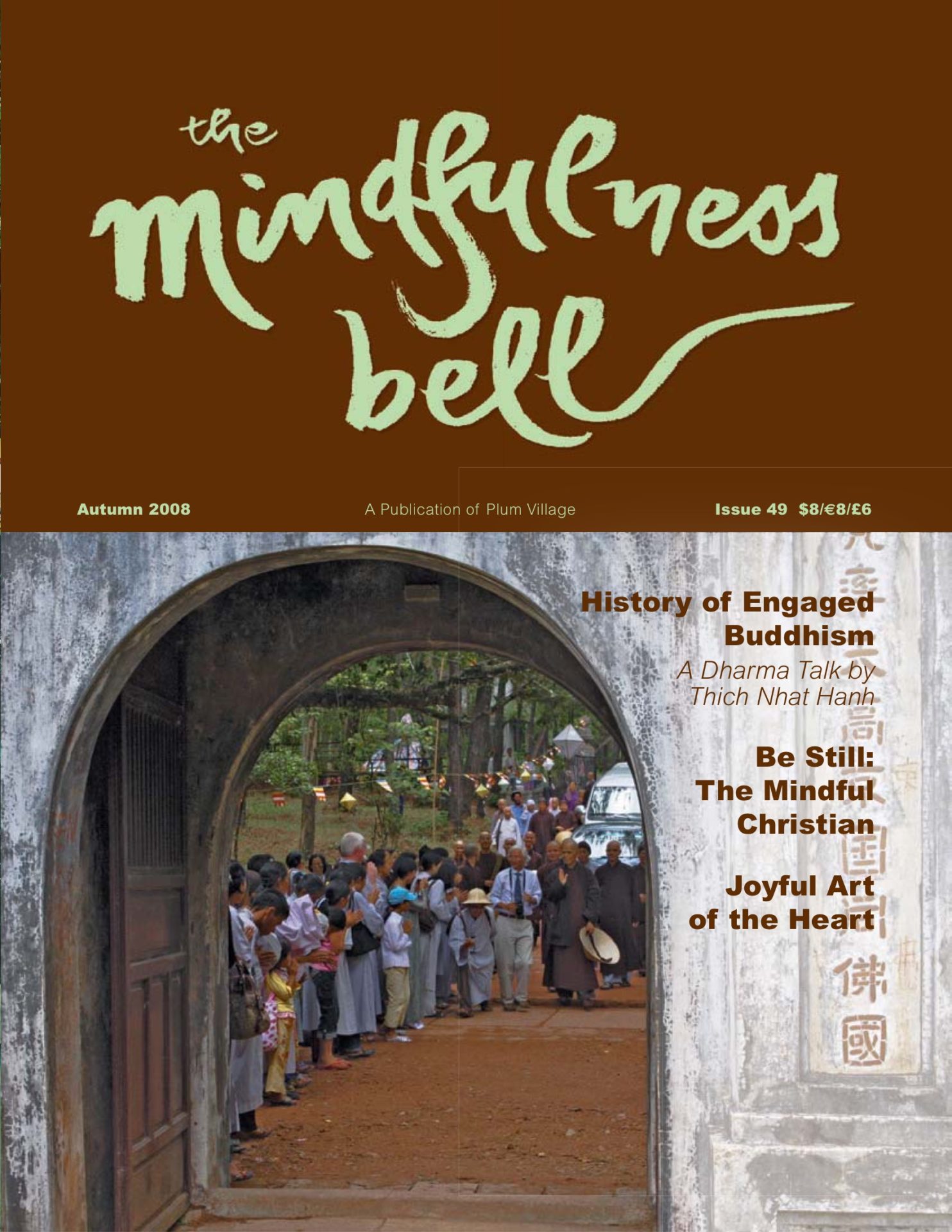Dharma Teachers Travel to South Africa and Botswana
From March 16 to April 2, 2008 three Plum Village Dharma teachers traveled to southern Africa: Sr. Chau Nghiem (Jewel) and her father Al Lingo, and Sr. Thuan Nghiem.
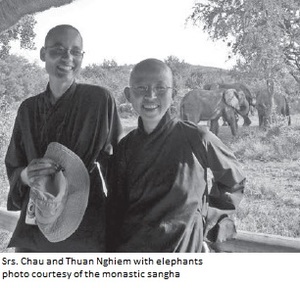
The group first spent ten days in Cape Town, South Africa, where they visited and shared at University of Western Cape theology seminar and gave a public talk. Next they visited the Nyanga Township and Etafeni Day Care Centre Trust,
Dharma Teachers Travel to South Africa and Botswana
From March 16 to April 2, 2008 three Plum Village Dharma teachers traveled to southern Africa: Sr. Chau Nghiem (Jewel) and her father Al Lingo, and Sr. Thuan Nghiem.

The group first spent ten days in Cape Town, South Africa, where they visited and shared at University of Western Cape theology seminar and gave a public talk. Next they visited the Nyanga Township and Etafeni Day Care Centre Trust, a multi-purpose centre for children affected by AIDS and their caregivers. Then they led an Easter Holiday weekend retreat, “Touching Stillness, Embracing Ourselves, Our Ancestors and Our Community” for thirty-eight adults and children.
Next they visited with the Group of Hope at Brandvlei Maximum Security Correctional Facility. “This was one of our most profound and memorable experiences in South Africa,” wrote Sister Chau Nghiem in her report to Thay and the Sangha. “The men there are under maximum security because of crimes like murder or armed robbery. The Group of Hope began with the intention to raise awareness about HIV in prison, to help reduce the discrimination towards prisoners with HIV. They wanted to do something for prisoners dying of AIDS and so they began a garden to grow vegetables for them and would visit them in the prison hospital and send cards home for them. This care and desire to educate others about the realities of HIV led them to widen their horizons. Soon, they began to sponsor twenty HIV-positive orphans, who come to the prison to visit with them once a month, bringing them lots of love and joy.”
During seven days in Gaborone, Botswana, the Dharma teachers gave a public talk and then visited a high school and the University of Botswana where they shared with faculty, staff and students. Then they led another weekend retreat and visited the Infectious Disease Care Clinic (for treatment of AIDS), and the Baylor Center (for children infected with HIV from birth) at the Princess Marina Hospital, Gaborone.
“Buddhism is quite a new religion to most people,” wrote Sister Chau Nghiem. “When we visited the IDCC, one of the nurses said she had never seen a real Buddhist before, only on television. We shared a guided meditation with all the nurses at IDCC to help them to be in touch with their bodies and emotions. They are overworked and experience a lot of stress. We offered them one of Thay’s calligraphies to post in their resting room, ‘Breathe, you are alive.’
“The next morning we had a tour of the whole Princess Marina hospital, the main public hospital in Gaborone. We dropped in to do a five minute guided meditation (and a much appreciated shoulder massage) for the head nurse, a matron who is so passionate about her work. She said: ‘I’d like to learn how to meditate but do not convert me to Buddhism, I love my God! I don’t understand why you have shaved your head and become nuns, but from time to time please send me a spiritual message from France so I can continue my stressful work here.’ We also visited the Baylor Center, which cares for HIV-positive children. Like IDCC, it is on the grounds of Princess Marina Hospital. An American pediatrician gave us a tour of this beautiful center and explained to us the challenges facing the society, as a whole generation of children with HIV were maturing into adolescents and experiencing the normal rebelliousness of that age and refusing to take their medication as instructed. She said that all sectors of society — education, family, social work, medical care — must cooperate to address this new challenge. We met many wonderful people and were very nourished by their aspirations.”
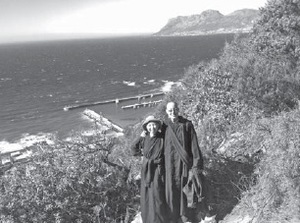
For recreation and renewal, they visited a local game reserve, to walk with elephants and to pet cheetahs. Sister Chau Nghiem wrote, “we had a very rewarding walk with elephants in the local Mokolodi game reserve. We walked with four teenage elephants who were orphaned as babies. Each of them weighs about three to four tons, and when they reach full maturity they will weigh five or six tons. They are so massive but so gentle to walk with. We walked alongside them and our feet made so much noise on the path, but the elephants walked completely silently. They taught us about walking meditation. Now I like to say, ‘Walk like an elephant.’ ”
In both regions the tour ended with a Sangha-building session to form a Sangha in Thay’s tradition. Racial inequality and the AIDS epidemic drew much of the group’s focus. Sister Chau Nghiem suggests that individuals and Sanghas can help with the wonderful work being done to address the AIDS epidemic in Africa by starting with these websites:

The Constant Innovation of the Dharma
At times my practice is plain and mundane. It goes through a normal routine of ebb and flow. This is when I know my practice needs an injection of something new. From the latest book by Thay to a retreat at Deer Park Monastery. Somewhere in between these two options a little known option is available to everyone worldwide — DPCAST.ORG, a Dharma portal available on the Web that brings the Dharma to you, the twenty-first-century practitioner. The latest Dharma gift from DPCAST.ORG features the practice of beginning anew from Sister Dang Nghiem and Brother Phap An. I advise you to visit DPCAST.ORG and listen in.
The acronym stands for Deer Park Podcast.You can download media from DPCAST.ORG or iTunes straight to your iPod, taking it on the go or listening to it through your desktop speakers. Alone or with a group of local practitioners; this is just the beginning of the constant innovation that has marked the rise of Buddhism across the world.
This Dharma-casting straight into your home and iPods was born after a group of Dharma friends were listening to Venerable Phuoc Tinh of Deer Park Monastery. The number of people in the audience of the Ocean of Peace Meditation Hall was considerably above average, yet I sighed at the fact that more people could not benefit from the wonderful teaching that day. Light bulbs also went off in Dharma friends Laura Hunter, Ron Forster, and Mike Guerena. A serious discussion followed and we formed an informal committee of sorts that has come to bear fruit with the support of the monastic community of Deer Park.
There are many barriers to learning the practice. Today, distance and location is not as great a barrier as it was in the time of the Buddha. Mike Guerena recalled his first visit to Deer Park Monastery as “stepping on egg shells,” due to his uneasiness from not knowing what to expect, not to mention the thirty-minute drive from his home in Fallbrook.
Thanks to innovation, the Dharma is available to you in the here and now; just as life is. Our practice is based on solidity and the most solid type of practice requires the involvement of Dharma friends. The most solid way to find Dharma friends is still at the monastery, face to face, shoulder to shoulder.
But failing that, come visit DPCAST.ORG! And give us feedback to contribute to the constant innovation of the Dharma.
— Nguyen Thanh Hoang (dpcast@gmail.com)
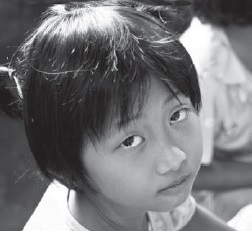
Announcing a New Blog: Mindful Kids
Resources for sharing mindfulness with children and a place to share ideas (http://mindfulkids.wordpress.com/)
This is a four-fold Sangha resource and we need your help and participation. Plum Village monastics are currently posting the principal practices we share with children in the Plum Village tradition: practicing with the bell, pebble meditation, the Two Promises, Deep Relaxation for Children, Touching the Earth for Children, eating meditation, embracing strong emotions, walking meditation, etc. We will also include guidance on how to set up a children’s program or children’s activities for a retreat, day of mindfulness, or a children’s Sangha. We will post ideas for cooperative games and nature activities, as well as practitioners’ experience of sharing mindfulness with children as parents, teachers, children’s program staff, etc. (This is where we need YOU!)
Please register on wordpress.com and share with us your experience, your stories, your joy, your difficulties — share how and what you are learning from children. Share with us what activities work and what don’t work so well yet. We also encourage children to share their experiences with the practice. Feel free to send us art, songs and photos that we can post on the blog.
— Sister Jewel, Chau Nghiem
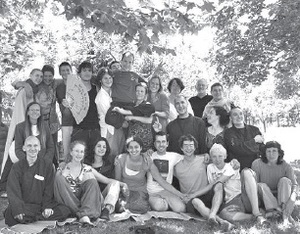
Wake Up!
Young Buddhists and non-Buddhists for a Healthy and Compassionate Society (http://wkup.org)
Inspired by Thay’s recent teachings, young monks and nuns of Plum Village, along with lay friends, have started an international organization called Wake Up:Young Buddhists and non-Buddhists for a Healthy and Compassionate Society. According to the group’s mission statement, “Wake Up is a community of young Dharma practitioners who want to help their society, which is overloaded with intolerance, discrimination, craving, anger and despair.
“Their practice is the Five Mindfulness Trainings, ethical guidelines offered by the Buddha; the most concrete practice of true love and compassion, clearly showing the way towards a life in harmony with each other and with the Earth. If you are a young practitioner you are urged to join the Wake Up movement in your country. We may feel anger and frustration when we see the environmental degradation caused by our society and we feel despair because we don’t seem to be strong enough individually to change our way of life. Wake Up offers us a way to pool our energy and act in synchrony. Let us get together and form a Wake Up group in our own town. Our collective practice will surely bring transformation and healing to individuals and society. Let us get in touch with young practitioners from Plum Village, both monastic and lay, to get more support and information....
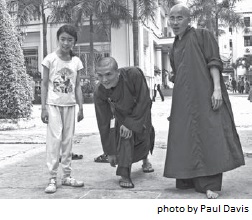
“Buddhism needs to be recognized as a source of wisdom, a long tradition of the practice of understanding and love and not just of devotion. The spirit of the Dharma is very close to the spirit of Science; both help us cultivate an open and non-discriminating mind. You can join the Wake Up Movement as a Christian, a Jew, a Muslim, an agnostic or an atheist. The practice of maitri, of loving kindness, the practice of sisterhood and brotherhood, is at the foundation of the Dharma.”
— Thanks to Sister Viet Nghiem

